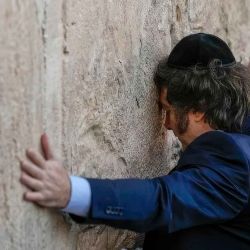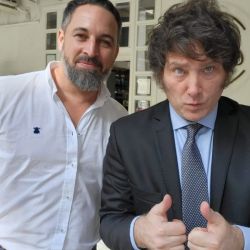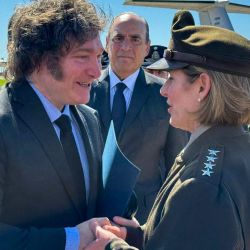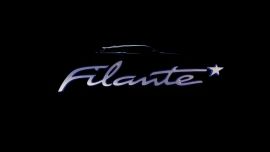Where does Javier Milei want to take Argentina and where does he want to position it? When Iran attacked Israel earlier this month, the President cancelled a tour abroad and returned to Argentina. He set up a "crisis committee" to deal with the conflict, which he invited the Israeli ambassador to participate in. The remoteness of the issue, coupled with the President's perceived understanding, fuelled doubts: what is the geopolitics of this government?
Behind the contentious moves, which sparked hours of debate about new carnal relations or alleged secret pacts, lies an even starker reality: the President moves Argentina according to his mystical whims and ultra-ideologised visions of reality. There is no room for geopolitical strategies or definitions. Milei is guided by an animalistic and messianic instinct.
Let's look at two examples, which were previously unknown.
November, 2023. Milei makes his first trip as Argentina's new president-elect, days before taking office. He goes to the United States not on a political or economic mission, but to visit the tomb of the last Chabad Lubavitch rabbi. Noticias magazine has been reporting that the beginning of Milei's road to power begins when, supposedly, God appears to him and assigns him the "mission" of becoming a presidential candidate. From that point of view, one can imagine the hidden reason for Milei’s visit to the resting place: the messianic thread that moves him.
However, there was one extra detail that never emerged when the trip took place. Milei had become obsessed with doing one thing while in the United States: he wanted to meet Donald Trump. Milei even made enquiries about travelling from New York to Florida, where the former president was. Those who were part of the La Libertad Avanza leader’s entourage during the trip said that it was a real ordeal to convince Milei otherwise. It would have been an affront to the Joe Biden administration if he had met with the former US president, especially given that Trump is the challenger in this year's elections. Finally, after much convincing, Milei gave up the idea, but it was an ideological whim that would have cost the country dearly.
The second example concerns Argentina's main trading partner and the tale does not have a happy ending. It happened a few days after the trip to the United States. On December 10, Milei took office. Among the VIP guests at his inauguration was former Brazil president Jair Bolsonaro, the arch-rival of veteran leftist Luiz Inácio Lula da Silva, the current head of state whom Milei has insulted on dozens of occasions. This time, unlike the Trump encounter that never materialised, the invitation to Bolsonaro was a direct and visible affront.
Foreign Minister Diana Mondino had previously tried to convince Milei of the delicacy of relations with Brazil. And to be fair, the President had gone further than others: the libertarian leader gave his top diplomat a letter, in his own handwriting, to take to Brasília. It was a formal invitation to Lula to attend his inauguration, which Mondino hand-delivered to her Brazilian counterpart, Mauro Viera, on November 26. He replied with a condition that seems logical: Lula would go if Milei disinvited Bolsonaro from the inauguration. The Argentine President, of course, refused. Knowing what happened on December 10, it is clear that in this case, Milei's ideological whims prevailed, and it has cost the country. Lula, says Argentines who still speak to him, is still waiting for an official apology.
These two episodes, in addition to the unusual invitation to the Israeli ambassador to attend the "crisis committee" – a fact Milei himself later denied, but whose veracity was confirmed by this magazine – reveal a worrying truth: there is no strategy in the libertarian's foreign policy.
Mysticism
On Tuesday, December 9, 2021, at noon, Milei was sworn in as a national deputy. From Congress he went straight to the flat in Recoleta where Álvaro Zicarelli lives. Zicarelli was, at the time, in the nascent version of La Libertad Avanza, in charge of international relations. A disciple of Juan José Sebreli and Carlos Escudé, he is a specialist in the area with several books to his credit.
As Milei entered the home, the economist’s mystical conviction was clear: "In two years I am going to be President. And the first thing I need to understand is how the world today works." He fell silent and dedicated himself to listening.
Time proved Milei's first sentence right. But the second seems off. He has expelled figures with some trajectory, such as Zicarelli (there are several others) and replaced them with politicians who are unfamiliar with the international area – Mondino, for example, was an economist all her life – or who are directly afraid of contradicting him. The government's relations with the world are now governed by the President's strange compass rather than by a detailed study of geopolitics.
Milei's trips abroad prove it: not one has escaped the logic of his whims. His first trip was the aforementioned trip to the United States, where he did not have a political meeting beyond a meeting with former US president Bill Clinton. Then came his participation at the World Economic Forum in Davos in January, which could have resulted in a search for investment but ended up producing something completely different: the President gave a striking speech in which he warned of the imminent danger of "communism," equated social democracy with Nazism and denied that the free market was flawed, a concept that in itself carries the same fanaticism as any religion.
On February 6, he visited Israel, which is not a relevant commercial partner of Argentina, and on February 24, he took part in the Conservative Political Action Conference (CPAC), a pro-Trump event that attracts the new right from around the globe. In early April he went to the United States again, this time to receive an award as an 'ambassador of light' from a Chabad Lubavitch organisation. (Readers of Noticias will have read reporting that in private, Milei says, that his mystical connection with God arrived thanks to a "channel of light" that Conan, his dead dog, opened for him from beyond the canine’s grave – is there a parallel between the two "lights"?)
The coming trips President Milei has planned are also along these lines. In May he will take part in Viva Europa, a festival organised by Vox, the ultra-conservative Spanish political party (which came third in recent elections), and in June he will travel to Germany, where he will receive an award from a liberal group.
‘The chosen one’
Milei often says that "he's crazy but not stupid." That's why he knows when to put the brakes on, especially when it comes to what he says in public about the supernatural presences he comes into contact with. But on more than one occasion, he has been close to going off the deep end. In 2021 he came close to revealing his connection to God to journalist Luis Novaresio when he told him that he "had proof that The One existed," and that "things had happened to him that science could not explain."
In an article he granted to a media outlet Israel when he travelled to the Middle East, Milei was asked about the reasoning behind his plan to move Argentina’s Embassy from Tel Aviv to Jerusalem. "When He ordered Moses to break the tablets, the first word he pronounced was Jerusalem, and King David established the capital there, so the Embassy must be moved there," the libertarian replied. The Israeli colleagues who interviewed him must not have understood that this was not a metaphor at all. In private, the president repeats that "King David told him in a dream" that he had to make the move. It is another clear example of how Milei's mystical whims have an impact on local and foreign reality.
Milei’s decision to invite Israel's ambassador to his "crisis committee" – and the importance the government gave to a conflict that is happening on the other side of the world – is along the same lines. The President sees Israel as a beacon in "the mission" he received from God. His supposed dialogue with God took place at the end of 2020, and in the middle of the following year Milei met Rabbi Shimon Axel Wahnish (now Argentina’s Ambassador to Israel), who told him that he would "lead a liberating movement in Argentina." Consciously or not, the rabbi touched the economist’s innermost motivation. Milei, who was a Christian for 52 years, now says "the ultimate hero of freedom is Moses, and those values are in Israel."
One should not look for anything other than a deep mystical conviction in the President's relationship with the country.
Tensions
Milei’s over-ideologised approach to understanding the world also has consequences for the two great global powers. In a hasty act with the head of the US Southern Command Laura Richardson, he announced the creation of a joint naval base in Ushuaia. The top US general is also the main critic of China's presence in Argentina, where it has a satellite base and contributes to various projects, such as the Santa Cruz dams.
This episode further strained relations with China, Argentina's second-largest trading partner, which had already been going badly thanks to the president's constant criticisms of Beijing. It is well known what Milei thinks of China and its president. More than once he accused them of being communists, using the harshest terms possible. Mondino herself has not helped the cause by receiving emissaries from Taiwan.
The foreign minister is travelling to China at the end of this month intending to put tensions aside but she faces a complex task. Added to this is can be the offensive that Milei has been waging against seemingly all his peers in the region, especially those he describes as "lefties": Gabriel Boric of Chile, Nicolás Maduro of Venezuela, Gustavo Petro of Colombia, Luis Arce of Bolivia, Andrés Manuel López Obrador of Mexico, as well as the aforementioned Lula.
Still, it is clear that some things escape Milei's gaze: sociologist Juan Gabriel Tokatlian revealed that, at the end of March, Argentina voted at the UN Women's Commission in line with Russia, Iran, Iraq and Nicaragua, while presidential chief-of-staff Karina Milei hired scanners for the Casa Rosada from the Chinese company Nuctech, which is banned in the United States for fear of data leaks. Or perhaps the president’s sister doesn't know where the company is from?
Either way, it is clear where Milei envisions Argentina's place in the world. It is one dictated by his whim, which is now the nation’s foreign policy.





























Comments